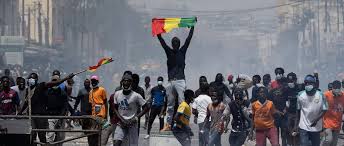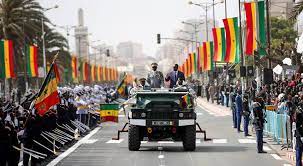This post discusses the political history of Senegal, the European Contacts, Independence, politics of Senegal and the Political system.
HISTORY
Senegal, officially the Republic of Senegal, is a country south of the Sénégal River in western Africa. The name “Senegal” comes from the Wolof Sunu Gaal, which means “Our Boat.” It is one of only a handful of countries to have a near-enclave within its borders—the small nation of The Gambia, which penetrates more than 320 km into Senegal, from the Atlantic coast to the center of Senegal along the Gambia River, which bisects Senegal’s territory.
Read: POLITICAL HISTORY OF ZAMBIA
Archaeological findings throughout the area indicate that Senegal was inhabited by 800 B.C.E., before the Sahara Desert began expanding southward and the region was wetter. Groups of megaliths up to 12 ft (3.5 m) high have been found near the mouth of the Senegal River.
Eastern Senegal was once part of the Empire of Ghana, which was based in Mali. In the ninth century, the Tukulor people founded the Tekrur Empire, which converted to Islam in the eleventh century. Islam remains the dominant religion in Senegal. In the thirteenth and fourteenth centuries, the area came under the influence of the Mandingo empires to the east. The Jolof Empire of Senegal also was founded during this time and reached its height in the fifteenth century, which is when the Portuguese first encountered them.

EUROPEAN CONTACTS
Various European powers – Portugal, the Netherlands, and England – competed for trade in the area from the fifteenth century onward, exchanging manufactured goods for hides, gum Arabic (used for making paper, candy, and textiles), gold, and slaves, but the Europeans were confined to specified areas. When the Portuguese arrived in the mid-fifteenth century, they found many of the tribes already engaging in slavery, using those acquired in raids for agriculture and trading them to Arabs for horses.
In 1617, France established its first permanent settlement in Senegal, at what had become an important slave trade departure point: the infamous island of Gorée next to modern Dakar. A French fort was built at Saint Louis in 1659. In 1840 Senegal was declared a French possession, and in the 1850s the French began to expand their foothold, both militarily and economically, onto the mainland, at the expense of native kingdoms such as Waalo, Cayor, Baol, and Jolof. Senegal became a major producer of groundnuts (peanuts), starting in 1839 and continuing into the 1960s.
INDEPENDENCE
In January 1959, representatives of French Sudan (now Mali), Senegal, Dahomey (now Benin), and Upper Volta (now Burkina Faso) drafted a constitution for a Federation of Mali, but only the assemblies of French Sudan and Senegal ratified it and became members of the federation. The Mali Federation became fully independent in June 1960, as a result of the transfer of power agreement signed with France. Due to internal political difficulties, the federation broke up in August. Senegal and Sudan (Mali) proclaimed independence. Léopold Senghor was elected Senegal’s first president in September 1960.
Senegal experienced its second peaceful transition of power, and its first from one political party to another. Wade drafted a more democratic constitution that abolished the Senate and reorganized the National Assembly and judiciary branch. Women were granted equal property rights.

In 2004, Wade signed a peace treaty with the separatist group in the Casamance region that was expected finally to end the 22-year-long rebellion, in which at least 3,500 people died, 50,000 refugees fled into The Gambia and Guinea-Bissau, and the region’s once-booming tourist economy virtually collapsed. Intermittent clashes among factions in the Casamance continued in 2007.
POLITICS OF SENEGAL
Politics in Senegal takes place within the framework of a presidential democratic republic. The President of Senegal is the head of state and government. Executive power in Senegal is concentrated in the president’s hands.
While legislative power is technically vested in both the government and the parliament, the parliament rarely introduces legislation or votes down legislation proposed by the government. Similarly, although the Judiciary is theoretically independent of the executive and the legislature, the executive branch seems to exert undue control over the judiciary.
Senegal is one of the few African states that has never experienced a coup d’état or exceptionally harsh authoritarianism. Léopold Senghor, the first president after independence, resigned in 1981, handing over the office of president to his Prime Minister, Abdou Diouf. The present president, Macky Sall, was elected in competitive democratic elections in March 2012. President Sall was re-elected in 2019.
Senegal has a reputation for transparency in government operations. The level of economic corruption that has damaged the development of the economies in other parts of the world is very low. Today Senegal has a democratic political culture, being part of one of the most successful democratic transitions in Africa.
POLITICAL SYSTEM
The President is elected by universal adult suffrage to a 5-year term (before: to a 7-year term). The unicameral National Assembly has 150 members, who are elected separately from the President. The Socialist Party dominated the National Assembly until April 2001, when in free and fair legislative elections; President Wade’s coalition won a majority (90 of 150 seats).
The Cour Suprême (Highest Appeals Court, equivalent to the U.S. Supreme Court) and the Constitutional Council, the justices of which are named by the President, are the nation’s highest tribunals. Senegal is divided into 11 administrative regions, each headed by a governor appointed by and responsible to the President. The law on decentralization, which came into effect in January 1998, distributed significant central government authority to regional assemblies.
